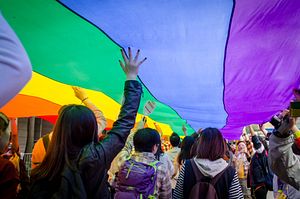Last week was an important one for LGBT communities throughout Asia, as a Taiwan court ruled that barring same-sex marriage in the country was unconstitutional. But, not far away from this massive step forward for gay rights in Asia, Hong Kong’s pro-establishment camp is looking to take a tentative step back.
Just a day before Taiwan’s ruling, more than 27,000 individuals, 80 civil groups, and five lawmakers petitioned the Hong Kong government to appeal a High Court April decision granting welfare benefits to the spouse of a gay civil servant. The next day Hong Kong’s Department of Justice appealed the High Court’s ruling.
“The government’s decision to appeal against that ruling is accordingly disappointing, to say the least,” Alfred Ip, chairman of the Pink Alliance, told The Diplomat. “Every legal battle against the authorities is a tough one for the LGBT communities.”
The original case goes back to 2014, when Hong Kong immigration officer Leung Chun-kwong married his decade-long partner in New Zealand, and Leung insisted that his husband was entitled to the same benefits available to the spouses of heterosexual employees. In late April of this year, a High Court judge in Hong Kong ruled for Leung.
Hong Kong, which doesn’t recognize gay marriage, saw blowback this week with a petition to appeal the ruling, led by pro-Beijing lawmakers Priscilla Leung, Holden Chow, Junius Ho, Shiu Ka-fai, and Michael Tien. Priscilla Leung was quoted as saying: “The ruling effectively recognizes same-sex marriage. It seriously affects our marriage system and the traditional family values of marriage between a man and a woman.”
“[The] Hong Kong government should take a more proactive approach in protecting the rights of the LGBT communities, not spending taxpayers’ monies to take the same away from them,” Ip told The Diplomat.
Holden Chow’s petition and opinions on gay rights prompted calls for him to resign from the Equal Opportunities Commission watchdog on Thursday; 41 civil groups, 19 lawmakers, and three political parties signed a joint statement demanding he step down from the EOC, citing his “anti-gay campaigns to deny sexual minority rights and incite homophobia.”
While Beijing’s rationalist and conservative platform plays its role, the petition’s organization came via the Society for Truth and Light, a right-wing Christian pressure group that has been at the forefront of opposing same-sex marriage – and, to a much lesser extent, masturbation – in Hong Kong.
Comparisons to Taiwan’s recent victory for gay rights did not go unnoticed by Hong Kong’s first openly gay legislator, Ray Chan, who came out in 2012. Chan said on his Facebook page: ”Just as Taiwan celebrates a marriage equality ruling, Hong Kong’s government filed the appeal against Angus Leung.”
Hong Kong has made large strides in LGBT rights in recent years, including movement on anti-discrimination legislation. However, Hong Kong law stands by the definition that marriage is between a man and a woman and rights – including rights to make medical decisions for spouses, visas, and tax benefits – are still denied.
Hong Kong’s small lean backward on LGBT rights last week comes in stark contrast to other Asian countries in the wake of Taiwan’s ruling. Illustrating the wide divide in LGBT rights throughout Asia, an army captain was sentenced to six months in prison in South Korea for having sex with other servicemen on Thursday and later in the week two men in Indonesia’s Sharia law-ruled Aceh region were caned 83 times each for consensual gay sex.
While Hong Kong is certainly ahead of many of its Asian neighbors and definitely ahead of the mainland when it comes to LGBTQ rights, the special administrative region is falling well behind Taiwan.

































